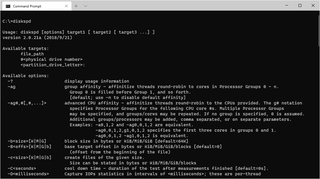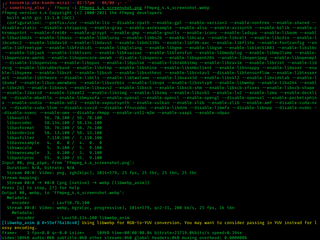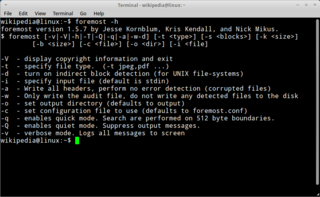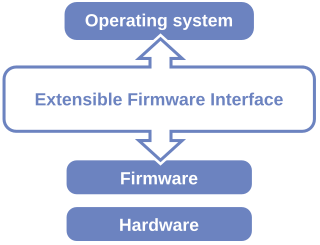 W
WDiskSpd is a free and open-source command-line tool for storage benchmarking on Microsoft Windows that generates a variety of requests against computer files, partitions or storage devices and presents collected statistics as text in the command-line interface or as an XML file.
 W
WDTrace is a comprehensive dynamic tracing framework originally created by Sun Microsystems for troubleshooting kernel and application problems on production systems in real time. Originally developed for Solaris, it has since been released under the free Common Development and Distribution License (CDDL) in OpenSolaris and its descendant illumos, and has been ported to several other Unix-like systems.
 W
Wexa is a command-line utility for listing files. It is promoted as "a modern replacement for ls" with features not present in ls, such as showing git status. exa is one of the first applications written in Rust to be included in Fedora, openSUSE, and Gentoo.
 W
WFFmpeg is a free and open-source software project consisting of a suite of libraries and programs for handling video, audio, and other multimedia files and streams. At its core is the command-line ffmpeg tool itself, designed for processing of video and audio files. It is widely used for format transcoding, basic editing, video scaling, video post-production effects and standards compliance.
 W
WForemost is a forensic data recovery program for Linux used to recover files using their headers, footers, and data structures through a process known as file carving. Although written for law enforcement use, it is freely available and can be used as a general data recovery tool.
 W
WGNU nano is a text editor for Unix-like computing systems or operating environments using a command line interface. It emulates the Pico text editor, part of the Pine email client, and also provides additional functionality. Unlike Pico, nano is licensed under the GNU General Public License (GPL). Released as free software by Chris Allegretta in 1999, nano became part of the GNU Project in 2001.
 W
WGraphicsMagick is a fork of ImageMagick, emphasizing stability of both programming API and command-line options. It was branched off ImageMagick's version 5.5.2 in 2002 after irreconcilable differences emerged in the developers' group.
 W
WImageMagick is a free and open-source cross-platform software suite for displaying, creating, converting, modifying, and editing raster images. Created in 1987 by John Cristy, it can read and write over 200 image file formats. It and its components are widely used in open-source applications.
 W
WInfo is a software utility which forms a hypertextual, multipage documentation and help viewer working on a command-line interface.
 W
WMathomatic is a free, portable, general-purpose computer algebra system (CAS) that can symbolically solve, simplify, combine, and compare algebraic equations, and can perform complex number, modular, and polynomial arithmetic, along with standard arithmetic. It does some symbolic calculus, numerical integration, and handles all elementary algebra except logarithms. Trigonometric functions can be entered and manipulated using complex exponentials, with the GNU m4 preprocessor. Not currently implemented are general functions like f(x), arbitrary-precision and interval arithmetic, and matrices.
 W
Wnpm is a package manager for the JavaScript programming language maintained by npm, Inc.
 W
WProcDump is a command-line application used for monitoring an application for CPU spikes and creating crash dumps during a spike. The crash dumps can then be used by an administrator or software developer to determine the cause of the spike. ProcDump supports monitoring of hung windows and unhandled exceptions. It can also create dumps based on the values of system performance counters.
 W
WThe Unified Extensible Firmware Interface (UEFI) is a publicly available specification that defines a software interface between an operating system and platform firmware. UEFI replaces the legacy Basic Input/Output System (BIOS) firmware interface originally present in all IBM PC-compatible personal computers, with most UEFI firmware implementations providing support for legacy BIOS services. UEFI can support remote diagnostics and repair of computers, even with no operating system installed.
 W
Wstrace is a diagnostic, debugging and instructional userspace utility for Linux. It is used to monitor and tamper with interactions between processes and the Linux kernel, which include system calls, signal deliveries, and changes of process state. The operation of strace is made possible by the kernel feature known as ptrace.
 W
WTaskwarrior is an open-source, cross platform time and task management tool, used to keep track of and handle tasks. It has a command-line interface rather than a graphical user interface.
 W
WVim is a free and open-source, screen-based text editor program for Unix. It is an improved clone of Bill Joy's vi. Vim's author, Bram Moolenaar, derived Vim from a port of the Stevie editor for Amiga and released a version to the public in 1991. Vim is designed for use both from a command-line interface and as a standalone application in a graphical user interface. Vim is released under the Vim license that includes some charityware clauses, encouraging users who enjoy the software to consider donating to children in Uganda. The Vim license is compatible with the GNU General Public License through a special clause allowing distribution of modified copies under the GNU GPL version 2.0 or later.
 W
WGNU Wget is a computer program that retrieves content from web servers. It is part of the GNU Project. Its name derives from "World Wide Web" and "get." It supports downloading via HTTP, HTTPS, and FTP.
 W
WThe Windows Package Manager is a free and open-source package manager designed by Microsoft for Windows 10 and Windows 11. It consists of a command-line utility and a set of services for installing applications. ISVs can use it as a distribution channel for their software packages.